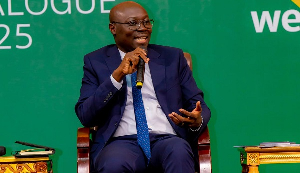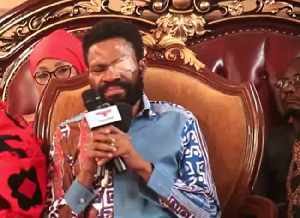The emergence of President Rawlings in the political scene in Ghana brought in a new dynamo for sustaining the freedom fight towards a free and liberated people on the continent of Africa. He strongly propagated philosophies and policies that would deepen the Pan African ideology and moral standard for integrity, justice and equality amongst the African peoples, and Africans in the diaspora; polices devoid of discrimination, racial segregation, ethnocentrism, nepotism, etc.
His country Ghana embraced him as an icon of diversity, religious tolerance and an apostle of equity for sociocultural and economic wellbeing. Notwithstanding the deep-seated Pan Africanist and revolutionary consciousness of FL. Lt. Jerry John Rawlings, he harnessed sister city relationships, bilateral partnerships and economic diplomacy; with both the West and the East, based on mutual respect and understanding for national sovereignty, universally shared values - promoting peaceful coexistence among nations - be them large or small, rich or poor; mitigating and redressing criminalities, wars, poverty, in a bid to restoring the dignity of humanity.
Rawlings directed his effort towards strategically positioning Ghana as a gateway to Africa and not an isolated nation in the global business community. Ghana chalked an enviable position among the member states within the economic community of the West Africa States and the AU and attracted world leaders like the queen of England and President Clinton of America, Nelson Mandela of South Africa and other global diplomats, who paid their visit and respect to Ghana during that period.
Rawlings, unlike many other leaders in Ghana’s history, subsequently led the country through difficult years of Economic Recovery Program and succeeded in giving back to Ghanaians, their national pride. Chazan (1983) observes, ‘’without Rawlings’ strength of character and unwavering determination, Ghana will not have survived the Economic Recovery Programs (ERPs) of the 1980s put in place by the ruling Provisional National Defence Council (PNDC)’’
Rawlings saw his leadership role to be that of a ‘’watchdog’’ for ordinary people and he addressed problems of incompetence, injustice and corruption. He could be likened to an angry common man against injustice; in other words, an advocate for the voiceless. He also instituted a transition from authoritarianism to multi-party democracy by decentralizing the functions of government from Accra to another part of the country. When the PNDC established the Peoples’ Defense Committees (PDCs), a system of cooperatives that became a unique move, never seen or administered in Ghana’s political economy.
In theory, the process of political change began in 1982 by Rawlings and the PNDC. The PNDC was a ‘’button-up’’ strategy to ensure the involvement of citizens in nation-building. This stance resulted in the promulgation of the 1992 Constitution; the formation of political parties, the holding of elections in 1992 and 1996 and the building of a rural (including grassroots) political base in Ghana. One of the most distinctive characteristics in Ghanaian politics was that the Rawlings regime’s commitment to liberal economic reforms after 1983 did change its obligation to PNDC’s original mandate. Before the implementation of Ghana’s ERP, The Rawlings’ regime pursued radical economic redistribution policies by courting the support of low-income classes.
Under the structural adjustment policies, business groups benefitted from price liberalization that generated profit margins. The influence of external interest increased under economic liberalization, including donor agencies and multi-national corporations (MNCs), especially on key sectors, since they are often viewed as representatives of foreign interests whose main objectives are to dominate less developed countries and entrenched their monopolistic positions in Africa. On the other side of the spectrum in implementing economic liberalization, bureaucrats, manual workers, and low-income consumers were not only directly affected by structural adjustment, but they also comprised the urban consumers who would suffer from reduced purchasing power and the eventual removal of government subsidies.
The emphasis of the ERP by the Rawlings’ regime was predicated on increased production in agriculture and industry, combined with reducing the budget deficit by cutting government subsidies and establishing a more efficient revenue mobilization and collection system. Rawlings, in his dealings with Ghanaians, exhibited the virtues of effective leadership by espousing the notion that, sound economic planning would be the only guarantee of improving the well-being of the people after years of decline.
The accomplishments of Rawlings during the 1980s and early 1990s reflects a period officially referred to as ‘’period of rebirth’’ in Ghana. Rawlings espoused a multi-dimensional concept of leadership in reforming the economy that embodied power, discretion and legitimacy, and his success as a leader was predicated on a two-way relationship that he had with the Ghanaian people. As a leader, he exerted influence, but he was also influenced by, and accountable to the people.
Critical Interventions under Rawlings Era
JJ Rawlings’ leadership in political Governance marked desirable position across the globe and would always be remembered for some specific numerous achievements and success stories but not limited to:
1. Restoring Ghana’s constitutional rule in 1992 after a public referendum by a wide majority approved a new constitution, neither Nigeria, Iraq, Togo nor was Côte d’Ivoire able to achieve this feat. (In Nigeria, two governments were overthrown during this period; a milestone that gave birth to the fourth Republic.)
2. It was during J.J Rawlings tenure as president that 110 districts were created through non-partisan district level elections. Education, infrastructural developments and healthcare were all devolved to the district level. Annual government subvention by law went to the district — unthinkable in many other African countries during that period. These efforts were promulgated into our constitution as LOCAL GOVERNMENT 1992, ACT 462.
3. Absorbing hundreds of thousands of Ghanaians living in Nigeria, who were expelled under unfriendly political position by his Nigerian Counterpart; housed them at El -Wak stadium (Accra) in 1983, and subsequently moved them to their family homes.
4. Passed the value-added tax (VAT of 10%) to secure the government revenue base, which today forms the base for revenue mobilization for the country and funds most government public expenditures.
5. Built the first-ever befitting memorials to Kwame Nkrumah and W.E.B. DuBois. A fit that consolidated the relevance and sacrifices of our Pan-African Struggle. The works of W.E.B Dubois in Ghana cannot over be emphasized.
6. Followed an independent foreign policy and was the first Ghanaian President in 20 years to be received on a state visit to the US, in February 1999.
7. The NDC’s agricultural policy and program 1994-2000 resulted in the recognition of Ghana’s Food Production Index of 148% for 1995-1997 as “the third-highest achievement in the record after Jordan (157%) and China (156%) in the World Bank’s “1999-2000 Development Report.”
8. The Middle-income group was expanded as part of Rawlings’ policy on rural development; this served an important role in the economy of the nation and its impact has extended even to this era.
9. The National Development Policy Framework (NDPF) was developed under the National Development Planning Commission in 1990. This stride laid the bases for Vision 2020 Plan for Ghana, to become a middle-income country by the year 2020.
10. The creation of District Assemblies’ Common Fund, the Get Fund, the Road Fund, the EDIF and the Energy Fund
11. The PNDC decentralized political power and the decision-making process: the regime promulgated its Blue Book on the Creation of District Authorities and Modalities for District Level Elections on July 1, 1987. Based largely on the reports of the Sowu Committee (1982) and the Public Administration Review and Decentralization Implementation Committee (PARDIC) established in 1983, the programme of decentralization was to ensure development at the grassroots and popular participation in decision-making. It was also to reduce rural-urban drift of the youth, rural unemployment and resource generation for development. As a follow-up, the PNDC established District, Municipal and Metropolitan Assemblies. The number of local government units thus increased from 65 to 110. The Assemblies were composed of members; two-thirds of which were elected by universal adult suffrage on a non-partisan basis, while the PNDC nominated one-third of the membership, acting in consultation with traditional authorities and organized productive economic groupings in the district. Subject to the Constitution, the Assemblies were not only the basic political authority but also the established deliberative, legislative and consultative body which had to ensure the development of the area under their control. They were to maintain security and public safety in the district or municipality in cooperation with the right national and local security agencies. They were also to ensure ready access to the courts for the promotion of justice.
12. Regional Coordinating Councils were established to serve as a link between the DAs/MAs and the central government. Composed of between 17 and 45 individuals of varying background. The RCC also had the duty of allocating to the districts, funds approved by government; reviewing and coordinating public services in the region.
13. With the assistance of the World Bank, the PNDC, under the Urban I and II projects strengthened the management and revenue mobilization capacities of DAs (eg. Sekondi/Takoradi, Kumasi, Tema and Tamale) and also improved lorry parks, rehabilitated markets, schools etc.
14. Defence Committees – People’s Defence Committee (PDC), later renamed the Committee for Defence Organizations (CDO) and the Committee for the Defence of the Revolution (CDR) and Workers’ Defence Committee (WDC) were set up as organs of peoples’ power and partners in the decision-making process. For instance, the WDCs at the workplaces acted as equal partners in the running of their organizations, institutions and factories. The PDCs which operated down to the village level sought to ensure fair deals within their communities. As Hansen puts it: “The Defence Committees . . . became the main channel for the articulation of demands by that social group which has been persistently left out of the political decision-making process by the class coalition which has ruled the country since independence.”
15. The PNDC’s response to the economic crisis was the launching in April 1983 of the Economic Recovery Programme (ERP). Officially divided into two phases – ERP 1 (1983-86) and ERP II (1987-89), designated the Structural Adjustment and Development Phase. Its objectives included arresting the decline in production in all sectors of the economy, particularly agriculture, including cocoa, and control factors that have been causing hyperinflation. It was also to sustain economic growth at between 5 and 5.5% a year over the medium term, increase domestic savings from about 7% at the end of ERP I to about 15% by the end of the decade and increase the level of public investment from about 10% of national income to about 15%.
It is instructive to note that, the Rawlings era and the revolution did not leave any scar at the detriment of the nation and its people. If there is any scar at all, and like in the case of the French and American Revolutions, it should rather serve as a point of reference to our socio-cultural, political and economic trajectory that could teach us how not to degenerate and plug Ghana into the abyss of corruption and poverty; a situation the nation experienced three decades ago.
Long live the ideals of the revolution,
Long live the Constitutional Rule,
Long live Ghana.
Opinions of Monday, 23 December 2019
Columnist: Donald Cog Senanu Agumenu



![New IGP, COP Christian Tetteh Yohonu [L] and immediate-past IGP, Dr. Akuffo Dampare New IGP, COP Christian Tetteh Yohonu [L] and immediate-past IGP, Dr. Akuffo Dampare](https://cdn.ghanaweb.com/imagelib/pics/140/14041582.295.jpg)











